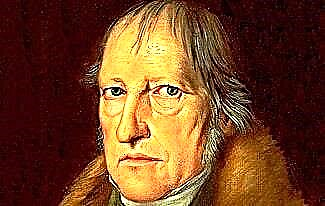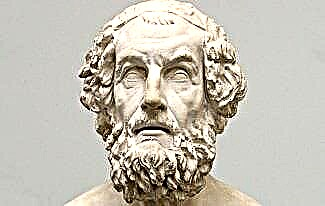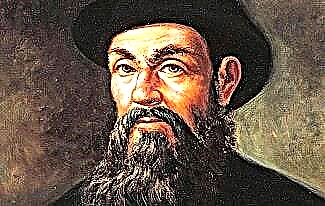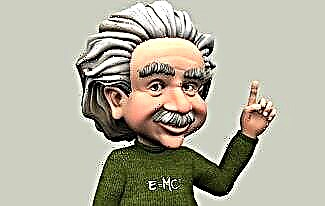Mikhail Alexandrovich Sholokhov (1905 - 1984) is one of the most prominent Russian Soviet writers. His novel “Quiet Don” is one of the greatest works of Russian literature in its entire history. Other novels - Virgin Soil Upturned and They Fought for the Motherland - are also included in the golden fund of the Russian printed word.

Sholokhov all his life remained a simple, calm, cheerful and sympathetic person. He was one of his own among the neighbors of the village and among those in power. He never hid his opinion, but he loved to play a trick on his friends. His house in the village of Vyoshenskaya, Rostov Region, was not only the writer's workplace, but also a reception room, to which people went from all over the area. Sholokhov helped many and did not repulse anyone. His fellow countrymen paid him with truly nationwide veneration.

Sholokhov belongs to the generation that has had its fill of difficulties and sorrows. The insanely brutal Civil War, collectivization, the Great Patriotic War, post-war reconstruction ... Mikhail Alexandrovich actively participated in all these events, and even managed to reflect them in his excellent books. The very description of his life, taken for it by someone, could become an epic novel.
1. From the marriage of Sholokhov's father and mother and the birth of Mikhail, you can make a full-fledged series. Alexander Sholokhov, although he belonged to the merchant class, was an enterprising and rather prosperous man. He was well-suited to the homes of landowners and was considered a good match for middle-class brides. But Alexander liked a simple maid who served in the house of the landowner Popova. On the Don, up to the October Revolution, serious class boundaries were preserved, so the marriage of a merchant's son to a maid was a shame for the family. Anastasia, the chosen one of Alexander, was passed off as a widower by order of the ataman. However, the young woman soon left her husband and began to live in the house of Alexander, who had separated from the family, under the guise of a housekeeper. Thus, Mikhail Sholokhov was born out of wedlock in 1905 and bore a different surname. Only in 1913, after the death of Anastasia's formal husband, the couple were able to get married and give their son the name Sholokhov instead of Kuznetsov.

2. The only marriage of Mikhail himself, apparently by inheritance, also did not go without incident. In 1923, he was going to marry the daughter of the orderly chieftain Gromoslavsky. The father-in-law, although he miraculously escaped being shot first by whites for serving in the Red Army, and then by reds during decossackization, was a tough man, and at first he did not want to give his daughter for an almost beggar, although he only gave her a sack of flour as a dowry. But the times were no longer the same, and it was difficult with grooms on the Don then - how many Cossack lives were taken by revolutions and wars. And in January 1924, Mikhail and Maria Sholokhovs became husband and wife. They lived in marriage for 60 years and 1 month, until the writer's death. In the marriage, 4 children were born - two boys, Alexander and Mikhail, and two girls, Svetlana and Maria. Maria Petrovna Sholokhova died in 1992 at the age of 91.

Together they were destined to live 60 years
3. Mikhail Alexandrovich from childhood absorbed knowledge like a sponge. Already a teenager, despite only 4 classes of gymnasium education, he was so erudite that he could talk with educated adults on philosophical topics. He did not stop self-education, and became a famous writer. In the 1930s, the “Writers' Shop” operated in Moscow, a bookstore engaged in the selection of literature on topics of interest. In just a few years, the shop staff collected Sholokhov's collection of books on philosophy, which consisted of more than 300 volumes. At the same time, the writer regularly crossed out books that were already in his library from the lists of offered literature.
4. Sholokhov had no time to study music, and nowhere, but he was a very musical person. Mikhail Alexandrovich independently mastered the mandolin and the piano and sang well. However, the latter is not surprising for a native of the Cossack Don. Of course, Sholokhov loved listening to Cossack and folk songs, as well as the works of Dmitry Shostakovich.
5. During the war, the house of the Sholokhovs in Vyoshenskaya was destroyed by a close explosion of an aerial bomb, the writer's mother died. Mikhail Alexandrovich really wanted to restore the old house, but the damage was too serious. I had to build a new one. They built it with a soft loan. It took three years to build the house, and the Sholokhovs paid for it for 10 years. But the house turned out to be great - with a large room, almost a hall, in which guests were received, the writer's study and spacious rooms.

Old house. It was nevertheless rebuilt

New house
6. Sholokhov's main hobbies were hunting and fishing. Even in the hungry months of his first visit to Moscow, he managed to constantly get somewhere outlandish fishing tackle: either small English hooks that could withstand a 15-kg catfish, or some kind of heavy-duty fishing line. Then, when the financial situation of the writer became much better, he acquired excellent fishing and hunting equipment. He always had several guns (at least 4), and the gem of his arsenal was an English rifle with a telescopic sight, just to hunt incredibly sensitive bustards.

7. In 1937, the first secretary of the Vyoshensky district party committee, Pyotr Lugovoi, the chairman of the district executive committee Tikhon Logachev, and the director of the winery Pyotr Krasikov, with whom Sholokhov had known since pre-revolutionary times, were arrested. Mikhail Alexandrovich first wrote letters, and then personally came to Moscow. The arrested were released right in the office of the later executed People's Commissar of Internal Affairs Nikolai Yezhov.
8. Sholokhov's work schedule from his youth until 1961, when the writer suffered a severe stroke, was very stressful. He got up no later than 4 in the morning and worked until breakfast at 7. Then he devoted time to public work - he was a deputy, received many visitors, received and sent a large number of letters. The evening began another session of work, which could continue until late. Under the inexorable influence of illness and military concussion, the duration of working hours was reduced, and Mikhail Alexandrovich's strength gradually left. After another serious illness in 1975, doctors directly forbade him to work, but Sholokhov still wrote at least a few pages. The Sholokhovs family went on vacation to places with good fishing or hunting - to Khoper, in Kazakhstan. Only in the last years of their lives did the Sholokhovs go on vacation abroad several times. And these trips were more like attempts to physically alienate Mikhail Alexandrovich from the workplace.

Work was for Sholokhov everything
9. 1957 Boris Pasternak handed over the manuscript of the novel "Doctor Zhivago" for publication abroad - in the USSR they did not want to publish the novel. A grandiose scandal erupted, from which the well-known phrase “I have not read Pasternak, but I condemn” was born (the newspapers published letters from work collectives condemning the writer's act). Condemnation, as always in the Soviet Union, was nationwide. Against the general background, Sholokhov's statement looked dissonant. While in France, Mikhail Alexandrovich said in an interview that it was necessary to publish Pasternak's novel in the Soviet Union. Readers would have appreciated the poor quality of the work, and they would have long forgotten about it. The leaders of the Union of Writers of the USSR and the Central Committee of the CPSU were shocked and demanded that Sholokhov disavow his words. The writer refused, and he got away with it.
10. Sholokhov smoked a pipe from his youth, cigarettes much less often. Typically, these pipe smokers have many stories associated with them. They were also in the biography of Mikhail Alexandrovich. During the war, he somehow went to Saratov to discuss the production of Virgin Soil Upturned in the evacuated Moscow Art Theater. The meeting took place in such a warm and friendly atmosphere that, going to the airfield, the writer forgot his pipe in the hostel. It was kept and later returned to its owner, despite several attempts to steal the precious memento. And when communicating with fellow countrymen as a delegate to party congresses and a deputy, Sholokhov often offered to arrange a smoke break, during which his pipe went throughout the hall, but lowly returned to the owner.

Mikhail Sholokhov and Ilya Erenburg
11. Many copies were broken (and still no, no, yes, they are breaking) around the authorship of The Quiet Don and the works of MA Sholokhov in general. The problem, as both studies and the discovery of the manuscript of The Quiet Don in 1999 have shown, is not worth a damn. If until the mid-1960s there was a semblance of scientific discussion around Sholokhov's authorship, then it became finally clear that accusations of plagiarism were not an attack on Sholokhov personally. It was an attack on the Soviet Union and its values. Comments accusing the writer of plagiarism were noted by most of the dissidents, regardless of their professional affiliation, and lyricism and physics. A. Solzhenitsyn distinguished himself in particular. In 1962 he glorified Sholokhov as “the author of the immortal“ Quiet Don ”, and exactly 12 years later he accused Mikhail Alexandrovich of plagiarism. The casket, as always, opens simply - Sholokhov criticized Solzhenitsyn's story “One Day in the Life of Ivan Denisovich” when they tried to nominate it for the Lenin Prize. On May 17, 1975, Mikhail Aleksandrovich read Solzhenitsyn's book "Butting a Calf with an Oak", in which the author threw mud at almost all Soviet writers. On May 19 he suffered a cerebral stroke.
12. During the Great Patriotic War, Sholokhov often went to the front, preferring cavalry units - there were many Cossacks there. During one of the trips, he participated in a long raid by Pavel Belov's corps along the enemy rear. And when Mikhail Aleksandrovich arrived in the corps of General Dovator, the gallant cavalrymen transferred him from the infantry (writers and journalists were assigned command ranks of different types of troops) to the cavalry. Sholokhov said that, having received such an offer, he refused. After all, such actions need an order from a higher command, etc. Then two hefty guys grabbed him by the arms, and the third changed the emblems on his collar tabs to cavalry ones. Sholokhov crossed paths at the front with Leonid Brezhnev. At a meeting in the early 1960s, Mikhail Alexandrovich greeted the then non-general secretary: "I wish you good health, Comrade Colonel!" Leonid Ilyich proudly corrected: "I am already a lieutenant general." Before the marshal rank, Brezhnev was less than 15 years old. He did not take offense at Sholokhov and presented the writer with a rifle with a telescopic sight on his 65th birthday.

13. In January 1942, Mikhail Alexandrovich was badly injured in a plane crash. The plane on which he flew from Kuibyshev to Moscow crashed on landing. Of all those present on board, only the pilot and Sholokhov survived. The writer received a severe concussion, the consequences of which were felt for the rest of his life. Son Michael remembered that his father's head was monstrously swollen.
14. Once, during the Great Patriotic War, Sholokhov simply escaped from the plenum of the USSR Writers' Union. He heard rumors about a possible famine in Vyoshenskaya - there was no seed for housing, equipment. Rushing home, with titanic efforts he knocked out tens of thousands of poods of wheat, building materials and even equipment. Only in the second half of 1947 he wrote a dozen letters to the district committee of the neighboring Vyoshenskaya district. The reasons: the collective farmer was unfairly given a term of correctional labor for the lack of workdays; the collective farmer suffers from a duodenal ulcer, but does not receive a referral to the hospital; the three times wounded front-line soldier was expelled from the collective farm. When in the mid-1950s virgin lands came to him, making a motorcycle race across the entire Soviet Union along the 52nd parallel, Mikhail Aleksandrovich could not receive them on the day of arrival - a delegation of British parliamentarians was visiting him. The next day, the motorcyclists talked with Sholokhov together with the delegates of the plenum of the secretaries of the district committees of the Communist Party of the Soviet Union, and in turn were waiting for the teacher from the Saratov region. Not all visitors and authors of letters to Sholokhov were disinterested. In 1967, the writer's secretary calculated that from January to May alone, letters to M. Sholokhov contained requests for financial assistance in the amount of 1.6 million rubles. The requests concerned both small amounts and serious ones - for a cooperative apartment, for a car.
15. It is believed that Sholokhov spoke at the 23rd Congress of the CPSU with criticism of A. Sinyavsky and Y. Daniel. These writers were subsequently sentenced to 7 and 5 years in prison for anti-Soviet agitation - they transferred their, indeed, not fiery with love for Soviet power, works abroad for publication. The power of the convicts' talent is evidenced by the fact that half a century after every radio receiver in the world broadcast about them, only people deeply immersed in the history of the dissident movement remember about them. Sholokhov spoke out very powerfully, recalling how during the Civil War on the Don they were put up against the wall for much lesser sins. The Russian Wikipedia says that after this speech, part of the intelligentsia condemned the writer, he “became odious”. In fact, only one paragraph of Sholokhov's speech was devoted to Sinyavsky and Daniel, in which he raised a lot of various issues, from creativity to the protection of Lake Baikal. And about the conviction ... In the same 1966, Sholokhov flew to Japan with a transfer in Khabarovsk. According to a journalist from a local newspaper, he was informed about this from the city party committee. Hundreds of Khabarovsk residents met Mikhail Alexandrovich at the airport. At two meetings with Sholokhov in the halls, there was nowhere for an apple to fall, and there were countless notes with questions. The writer's schedule was so tight that the correspondent of an army district newspaper, just to get an autograph from the writer, had to trick into the hotel where Sholokhov lived.
16. Of the Soviet awards received for literary works, Mikhail Alexandrovich Sholokhov did not spend a dime on himself or his family. The Stalin Prize (100,000 rubles at that time with an average salary of 339 rubles), received in 1941, he transferred to the Defense Fund. At the expense of the Lenin Prize (1960, 100,000 rubles with an average salary of 783 rubles), a school was built in the village of Bazkovskaya. Part of the 1965 Nobel Prize ($ 54,000) was spent traveling around the world, part of Sholokhov donated to the construction of a club and a library in Vyoshenskaya.
17. The news that Sholokhov was awarded the Nobel Prize came at a time when the writer was fishing in remote places in the Urals. Several local journalists went there, to Lake Zhaltyrkul, almost off-road, dreaming of taking the first interview with the writer after the award. However, Mikhail Aleksandrovich disappointed them - the interview was promised to Pravda. Moreover, he did not even want to leave fishing ahead of schedule. Already when a special plane was sent for him, Sholokhov had to return to civilization.

Sholokhov's speech after the Nobel Prize award
18. Under the ideologically softer rule of LI Brezhnev, it was much more difficult for Sholokhov to publish than under JV Stalin. The writer himself complained that "Quiet Don", "Virgin Land Upturned" and the first part of the novel "They Fought for the Motherland" were published immediately and without political nagging. For the reprint of "They Fought for their Homeland" had to edit. The second book of the novel was not published for a long time without a clear explanation of the reasons. According to his daughter, in the end Sholokhov burned the manuscript.
19. Works by M. Sholokhov were published more than 1400 times in dozens of countries around the world with a total circulation of more than 105 million copies. Vietnamese writer Nguyen Din Thi said that in 1950 a guy returned to his village, having completed his education in Paris. He brought with him a copy of The Quiet Don in French.The book went from hand to hand until it began to decay. In those years, the Vietnamese had no time for book publishing - there was a bloody war with the United States. And then, in order to preserve the book, it was rewritten by hand many times. It was in such a handwritten version that Nguyen Din Thi read “Quiet Don”.

Books by M. Sholokhov in foreign languages
20. At the end of his life Sholokhov suffered a lot and was seriously ill: blood pressure, diabetes, and then cancer. His last active public action was a letter to the Politburo of the CPSU Central Committee. In this letter Sholokhov outlined his view of not insufficient, in his opinion, attention paid to Russian history and culture. Through television and the press, Sholokhov wrote, anti-Russian ideas are actively being dragged through. World Zionism discredits Russian culture especially furiously. The Politburo set up a special commission to respond to Sholokhov. The fruit of her labors was a note that any lower-level Komsomol apparatchik could have created. The note was about "unanimous support", "the spiritual potential of the Russian and other peoples", "L. And Brezhnev's posing of cultural issues," and further in the same vein. The writer was pointed out to his gross ideological and political mistakes. There were 7 years left before perestroika, 13 years before the collapse of the USSR and the CPSU.









